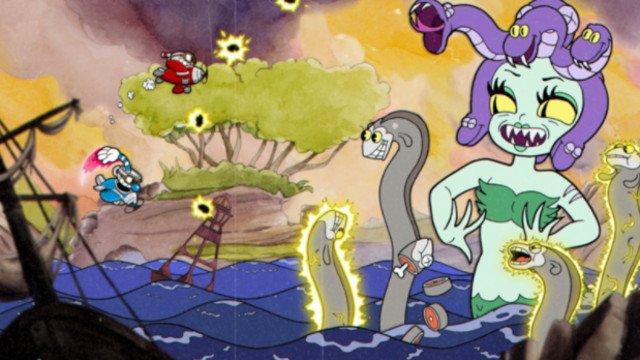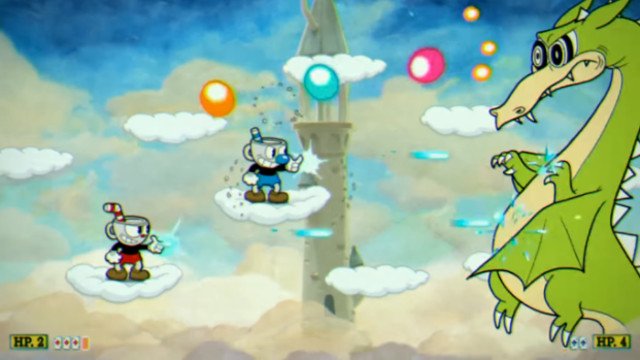Cuphead is not a demo-friendly game. It’s incredible difficulty requires your undivided attention and a complete understanding of its systems; something a thirty-minute preview can’t easily facilitate. But I don’t blame Cuphead for not being easy and immediately-accessible nor do I blame its previewers for not being ESL-level professionals at a difficult game they’ve been thrusted in the middle of. Cuphead’s vision keeps it from demo nirvana but, in turn, opens up in a satisfying way once you are allowed to put in the time to learn it.
However, Cuphead doesn’t ask you to learn its systems; it demands it. The levels are split between traditional Megaman-like, run-and-gun platforming and boss rushes and the punishing difficulty and lack of checkpoints in each ensures that you can’t fumble your way to victory. Pattern memorization and quick reactions are necessary and the controls feel responsive enough to bear the weight of the game’s difficulty. As Cuphead or, if you’re playing in co-op, Mugman, you can jump, shoot, parry, dodge, duck, and switch weapons.
Absorbing all of those mechanics in a hostile environment was hard to wrap my mind and fingers around at first, as I spent more time admiring the Game Over screen than the actual gameplay. Discouraged and frustrated, I was tired of dying over and over at the hands of Cuphead’s long, seemingly-tedious gauntlets and ready to move on.
But then, it clicked.
I realized that Cuphead wasn’t about speeding through worlds, but, rather, mastering individual levels and getting better with every death. In essence, the whole game is a marathon composed of other smaller marathons and sprinting to the end, like I was doing at first, is a foolish way to play.

The game started opening up to me as the mechanics, one by one, started opening up to me. First, I had to grasp shooting while jumping around. Since most of the levels are long boss fights, merely avoiding projectiles isn’t going to cut it; you’ve got to shoot your own too. Weaving in and out of bullet patterns and remembering to fire back is initially overwhelming and takes some getting used to. Homing shots alleviate having to aim but do less damage, which puts more pressure on your defensive skills and pushes you to learn how to multitask in order to do more damage. Balancing offense while playing defense is key and an essential first hurdle that Cuphead requires that you jump over if you expect to go any further.
Also: Cuphead Reignites the “Game Journalists Should Be Good at Games” Debate
Dashing also helps players avoid hazards, which was the next mechanic that opened up to me. It’s exactly what it sounds like: you slide quickly in one direction to evade attacks. But it was hard to have the remaining brain power to utilize the dash well, given the hectic nature of the mentally exhaustive levels. Although once I began to link dashing and jumping, I felt like I had more control of the screen since I could move vertically and horizontally to avoid danger. This was especially helpful against my fight against a dragon named Grim Matchstick, as safe ground was at a premium and regular, upward jumps weren’t always the safest option.
Remember when I said that the homing shot was weak? Part of that was my fault for not switching to the other weapons as I focused all of my initial energy on jumping and shooting. Tapping the shoulder button instantly swaps to your other slotted weapon, which was, in my demo, a short-ranged, shotgun-like blast. Bosses fell much quicker as I began to use the homing shots for more chaotic situations and the spread blast for focused, offensive efforts. It was just another way I could play more efficiently and understand how to intelligently combine the tools at my disposal.

The hardest mechanic that I didn’t get to fully grasp was the parry system. Any pink projectile can be parried by leaping into it and double tapping the jump button at precisely the right time. Not only will doing so absolve you from damage and eliminate that projectile from the screen, but it’ll also charge up your Super Move more quickly. Super Moves are devastating attacks that act as a useful Get Out of Jail Free card when you get overwhelmed. Timing parries is difficult but a clever way to encourage skilled defensive play with a powerful, offensive reward.
While this all may seem like I’m leading up me saying to how I now see Cuphead how Neo sees the Matrix at the end of The Matrix; it’s not. The game still kicked my ass but that’s partly to do with my refusal to knock it down to the lower setting. The Simple difficulty is just what it sounds like: a shorter, simpler level with fewer attacks to avoid and boss stages to deal with. While I would hesitate to call this mode “easy” since you still need to beat the level in one go, it’s definitely easier than the Regular mode. Conquering levels on Regular mode gave me more trouble than Simple mode, but exponentially more satisfaction upon reaching the end. Yes, I mostly got D rankings but finishing any level on Regular mode was an accomplishment in and of itself and a cause for celebration.
The satisfaction of learning Cuphead’s systems and overcoming its obstacles was easily worth the early frustrations. Like an onion, the many layers of Cuphead need to be peeled back in order to enjoy it and, also like an onion, it might first require a bit of light crying to get to the deeper parts. But once its systems calcify in your brain and begin to feel more natural, it exhibits a sense of nuance and complexity that a short demo can’t possibly convey. Short demos can show off how gorgeous its 1930s cartoon-like art style is and how unforgiving it can be, but extended periods with the game can more accurately depict what it is. While we will have to wait until September 29th to truly see how it all unfolds, Cuphead looks to be a fulfilling, run-and-gun platformer that rewards skilled players who stick around long enough to learn it.









